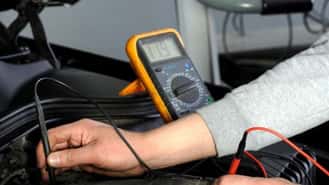On newer vehicles, a coil pack replaces the distributor. It is an electronically controlled pack of ignition coils regulated by the car's computer and is used to create the spark for each engine cylinder's spark plug. Generally speaking, coil packs are much more reliable than distributors, because there are no moving parts and because they fire much less often than a distributor. Coil packs usually create a better spark, which in turn produces better combustion and horsepower in a car's engine.
How a Coil Pack Works
When creating a spark at the spark plug, the fire must initiate from a high voltage supply, so as much fuel as possible burns in the cylinder. Whenever the combustion process is started, the coil pack builds up the energy, as much as 50,000 to 75,000 Volts. When the electronic control module (the car computer) sends the signal to the ignition control, the voltage is released from the coil pack through the spark plug cables to the spark plug.
When the spark travels to the spark plug, it jumps from the spark plug gap to the ground, causing an explosion of the fuel air mixture inside the cylinder chamber.
Coil Pack Problems
Usually, if a coil pack is bad, there will be a loss of fire or spark in one or more cylinders. This causes what's commonly referred to as misfiring. Misfiring can cause drag on the crankshaft, and usually results in a very poor performing engine.
Common Symptoms of a Faulty Coil Pack
A faulty coil pack will generally have symptoms similar to a faulty spark plug. Some of the most common tell tale signs that a coil may be defective include:
- A rough idle
- An unexplainably louder-than-usual engine
- A noticeable lack of power
- A significant drop in RPMs while accelerating for no apparent reason
- A blinking or intermittently activating check engine light
- An active gas warning light when the vehicle has plenty of gasoline
- Smoke from the exhaust emitting intermittently, instead of in a steady stream
How to Test a Coil Pack
Fortunately, there is an easy way to test the coil packs in your vehicle and make sure they're working as they should. You need to use ohm meter to test the coil pack for continuity. Make sure you have the approximate ohm values for the coil pack. To find this information, research your car's engine on the Internet or purchase a Chilton's or Haynes manual to find out what the mega ohms reading on the coil pack should be.
Coil Packs vs. Distributors
Whereas in the past, vehicles used a distributor to pass the thousands of volts needed to create a spark from the ignition coil to the sparkplugs, modern ignition systems now use one coil for each sparkplug or in some cases one coil for two sparkplugs. Many times, these multiple coils are mounted in a single mounting block with multiple terminals, thus the term coil pack.
Coil Pack Advantages
Coil packs began to be implemented in many vehicles during the late 1990's. The biggest reason most manufacturers have turned to coil packs is they are more reliable. Many coil packs don't require service for up to 120,000 to 150,000 miles. Also, distributors are very prone to failure if they become wet or the engine happens to be submerged under water for a few seconds. Coil packs tend to operate even when they have been thoroughly doused with water.
In addition to being more reliable, coil packs are generally credited with providing more horsepower and torque than a common distributor. Because a coil pack generally creates a much more efficient spark, it also known to provide a slight fuel efficiency improvement over vehicles that use standard distributor caps. While some modern vehicles do still use a distributor system, there are aftermarket upgrades that many car enthusiasts add to improve performance, reduce maintenance and improve fuel economy.
What Coil Pack Works with a Rotary Engine?
Most rotary engines require a different type of ignition coil pack. Below are two, one for a standard replacement, and one that is a higher voltage performance type coil pack.
Original Equipment Replacement
Beck Arnley is a well known name in the automotive ignition parts industry. They are favored by many mechanics, especially those that work mostly on import cars. The Beck Arnley 178-8025 rotary engine coil pack is a direct replacement for original equipment parts on older Mazda cars with a rotary engine. You can expect to pay about $55 for one.
Performance Replacement
M&W Ignition Systems is a fairly well known name in the import performance market. Their part number PAK005 is a high performance ignition coil pack for the performance enthusiast who isn't afraid to spend a little more on a high quality high performance part. With prices running around $245 for a double coil pack for direct fire ignitions, these coil packs will deliver years of excellent performance.
When ordering a coil pack for your rotary engine equipped car, you need to know the year and model as well as the engine displacement to ensure you are given the correct parts.





 How to Tell If You Have a Faulty Distributor
How to Tell If You Have a Faulty Distributor How to Tell if You Have a Faulty Engine Speed Sensor
How to Tell if You Have a Faulty Engine Speed Sensor 2021 Ford F-150 Raptor Gains New Suspension, Tech
2021 Ford F-150 Raptor Gains New Suspension, Tech 2021 Acura TLX To Get New Front Suspension
2021 Acura TLX To Get New Front Suspension Next-Gen Ford F-150 Raptor Could Get 750 HP Mustang Engine
Next-Gen Ford F-150 Raptor Could Get 750 HP Mustang Engine
